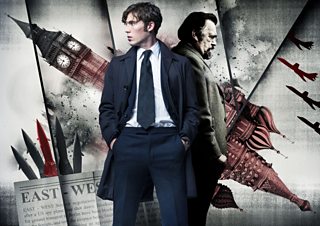
The Game
What was your inspiration for writing The Game?
My brother had recommended I read , by John le Carre. I’d never read any le Carre before and it was a revelation. I was fascinated by the world, by the era and especially the Cold war – this invisible conflict that raged all around us until relatively recently. I grew up in the 70s and 80s, and we all assumed that sooner or later – probably sooner – we’d be obliterated by a nuclear bomb. It seems peculiar now, but at the time the threat seemed so great, so constant. The more I read about the Cold War the more fascinated I became. But it wasn’t the version of the Secret Service that interested me, instead it was the melancholy noir of le Carre’s world that I wanted to explore.
Weirdly I think there is a connection between the world of and the world of . Again, it’s a story about a conflict that’s taking place just out of sight. When I was growing up, I was an obsessive comic book fan and an avid reader, and the stories I liked most were the ones taking place in our world. I hated school, and was always escaping into my imagination, creating stories and characters. But they had to be in a world I could recognize, one just around the corner that I could flee to. On 'Being Human' the one rule we had was that the populace could never find out about the existence of vampires and werewolves and ghosts, because the moment they did that, it stopped being our world. And as I said, I think there’s an echo of that in 'The Game' – a secret war happening in the corner of our eye.
Anyway all this coincided with a meeting I had at the 主播大秀. 'Being Human' was coming to an end and I needed to start thinking about what I wanted to do next. I talked to about it, about the world and early thoughts about characters and stories. He liked the idea and commissioned a script.
How did you come up with the storyline and characters, and what is your writing process?
I always start from character. Always. I can’t imagine any other way of working.
So having decided on the world, I’ll take a step back and start devising the characters. I won’t think about stories until the characters are taking shape. I’ll write pages and pages of biogs for them, which, most of the time, are never seen by the actors who end up playing those parts. That’s my way in. But the moment the characters start to form, then stories will suggest themselves. “Oh, now I’ve decided that this character is aggressively ambitious, it would be good to have an episode where they are hindered by this character…” and so on.
I really like storylining with a script editor and a producer / executive producer. It was a habit I developed from working with on and , and I took it to 'Being Human' and 'The Game'. I always find that throwing stories and ideas around with other people leads you to places that you’d never have found on your own. I know a lot of writers prefer to work alone, and certainly once I’ve started the script I seal myself up in my office and don’t speak to anyone, but at this stage I really enjoy fleshing the stories out with other people.
Once we’ve got rough outlines for the other episodes, we’ll bring in the other writers and I’ll brief them on the series. Then we’ll meet again individually and dig into their episodes.
and wrote episodes 3 and 4 respectively (and Sarah and I sort of tag-teamed episode 5) and they both delivered absolutely amazing scripts.
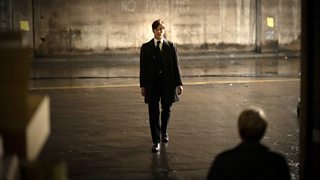
The Game: Joe Lambe (Tom Hughes) Photo: Des Willie
Were you involved with the casting or production and does it match your vision?
Yes, as an Executive Producer I was across the casting and the major production decisions. The casting process was very democratic. We all got one vote, and the actor with the most votes got the part. Simple as that. Though 9 times out of 10 we all agreed anyway. We saw amazing people for all of the parts, but in each case the one we wanted just shone through and the decision was made for us.
I couldn’t be happier with the finished show. directed it beautifully, and , our designer, did an extraordinary job recreating that world and that era, not to mention building us that stunning set.
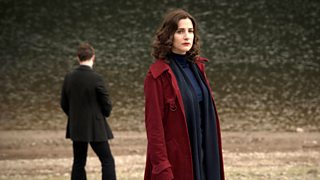
The Game: Joe Lambe (Tom Hughes), Yulia (Zana Marjanovic)
What were the particular challenges and research that the project presented?
The is, perhaps unsurprisingly, a little reticent about sharing their methods and intentions to nosy screenwriters, so I had to glean what I could from books and fill in the gaps myself. We had an amazing technical advisor, who had been part of that world until relatively recently, and they would steer us back onto the right path if we were going too far astray – or perhaps too close to the truth..? But it was the small procedural things that we learned that give the show its texture and realism. The scene in episode 1 where meets for the first time, our advisor told us about the shape those meetings take, what is asked and how it would be conducted. For instance, Joe’s first question is ‘How long have you got?’ That would always be the first thing an Intelligence Officer would ask a potential agent.
Aside from that – and this is a challenge I set myself, I guess – but I wanted it set it in a very ‘low fi’ era, as it meant we couldn’t find shortcuts through the stories. No mobile phones, no facial recognition software, no satellite tracking. Everything had to be solved through ingenuity and cunning.
Also, as I said earlier, the threat of nuclear war was so real and potent in the 70s, and one of the challenges – particularly in episode 2 – was recreating that tension. Especially because we know it didn’t actually happen. So I wrote in a sequence with a public information film about what to do in the event of a nuclear war. Those films would be broadcast fairly regularly back then and it was weird revisiting them, I’d forgotten how chilling they were.
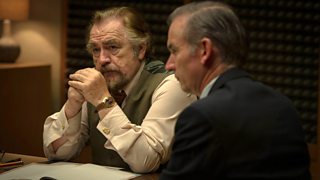
The Game: Daddy (Brian Cox), Bobby Waterhouse (Paul Ritter) Photo: Des Willie
How did you get into writing for TV?
Well I started out as an actor. And before that I’d gone to Art College, so I’m not sure I thought ‘I could be a writer’ until I was in my mid 20s.
As with most actors, I had a lot of spare time, and so to keep myself sane I wrote a play. The plan was I’d put it on in some sticky carpet pub theatre with my unemployed actor friends. But it took on a life of its own. I got a literary agent and we entered it for a competition called the , which it won and became the opening production at in London. After that I started being offered TV scripts to write – my first was an episode of – but all the time I was thinking “yes, but what if my acting career suddenly takes off?!” I needn’t have worried. It stayed on the runway.
I absolutely loved writing, but it was scary and it’s taken years for me not to feel overwhelmed by it. I hadn’t been to university, I was – and still am – always the least ‘qualified’ person in the room. But as time went on I gained more confidence.
I was incredibly lucky – one job led to another and so on. But there was never a specific moment when I abandoned acting, or indeed decided I was a writer. These things happen incrementally. I’ve grown to love my job. There really are few things I’d rather be doing than writing, and I could never return to the sense of powerlessness and frustration I felt as an actor.
Ultimately both jobs are about storytelling. And I think that’s what I really wanted to do. I’ve just changed the method.
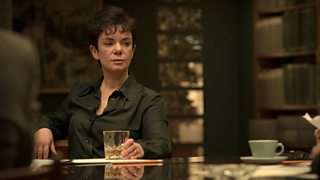
The Game: Sarah Montag (Victoria Hamilton) Photo: Des Willie
Were there particular programmes that you grew up with that made you think ‘I want to do that’?
I remember there was a season of plays on 主播大秀2 – The Birthday Party, The Dumb Waiter, One for the Road – and they blew my mind. Also, a very strange noir thriller called . I absolutely loved that. , and of course. – the John Duttine version obviously. . . . I can see elements of all of them in what I write now.
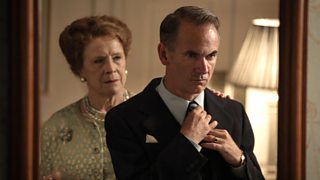
The Game: Hester Waterhouse (Judy Parfitt), Bobby Waterhouse (Paul Ritter) Photo: Des Willie
Can you share any advice?
The trap I fell into when I was starting out was trying to imitate someone else’s voice. I’ve got piles of abandoned plays and screenplays, written in the style of or or . I guess it’s a necessary part of the process, as you define your own voice.
I remember when I was writing the pilot for 'Being Human'. We’d really been round the houses on this project and to be honest I was getting really bored. I thought, there was no way this show was ever going to get made. Once I realized that I felt completely liberated. Suddenly it was really exciting again. As soon as I decided there was never going to be an audience for this show, I could stop worrying about whether the audience would like it. And I think it was that script more than anything I’ve written that defined my voice as a writer. So I guess my advice would be: dance as if no one’s watching, write as if no one’s reading.
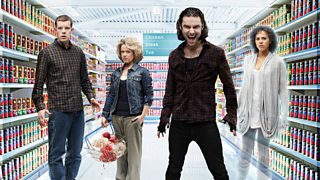
Being Human
Do you think you’ll ever revisit Being Human?
We all know shows that have outstayed their welcome, or been cynically resurrected. And no one would thank me – least of all the 'Being Human' fans – if I went back with anything other than a stunning and revolutionary idea. Anything less would demean the show. And I haven’t had that idea.
What is it like being involved with Doctor Who? Was that a dream come true?
Absolutely. And it’s not just me. Look at the writers on any series of 'Doctor Who'. One fairly recent season had 8 showrunners writing episodes. These aren’t writers who struggle to find work. But we all go back, year after year, because there’s something magical about it. It’s one of those things, if I have to explain it, you’ll never understand. Putting INT. TARDIS. at the top of a scene never stops being exciting.
The Game begins on 主播大秀 Two on Thursday 30 April 2015 at 9pm
